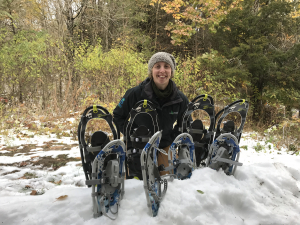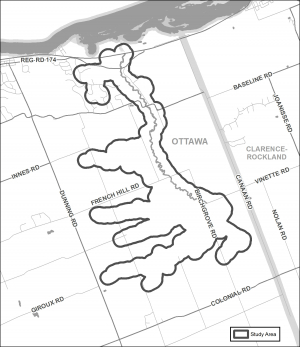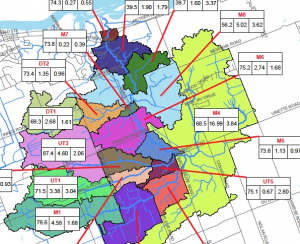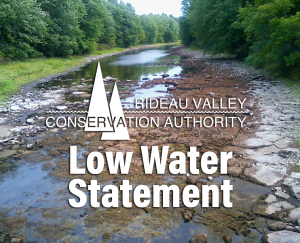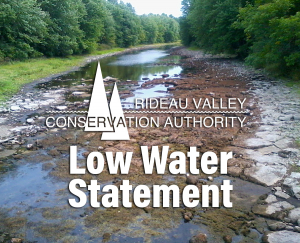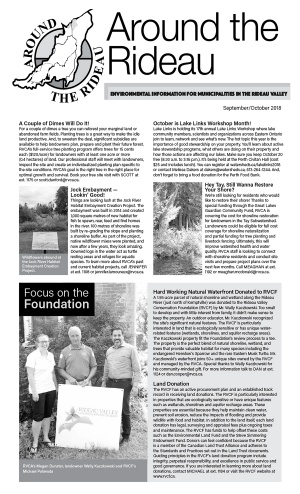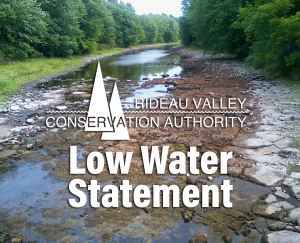Super User
Friends of Foley Mountain Invest in Children and Outdoor Education with Purchase of Snowshoes
EASTERN ONTARIO, November 19, 2018 — Thanks to the hard work and fundraising efforts of the Friends of Foley Mountain, hundreds of students will be able to experience the wonder of Foley Mountain trails by snowshoe this winter. Forty-four new pairs of snowshoes arrived at the Conservation Area last week, just in time for winter programing.
Foley Mountain Conservation Area, owned and operated by the Rideau Valley Conservation Authority (RVCA), welcomes over 2,500 students annually to learn about nature and their local environment. Winter programing has traditionally included the opportunity for students to experience one of the oldest forms of transportation in Canada. Students learn how to safely travel with snowshoes and, once comfortable, follow the snowshoe trail through the forest and try snowshoe games.
“Our snowshoe program has been very popular — which is amazing! But it means we need more shoes or have to replace worn equipment to accommodate the demand,” said Rebecca Whitman, Foley Mountain Area Supervisor and Outdoor Educator. “We are delighted to have partners like the Friends of Foley Mountain and Trailhead Kingston who want to help us maintain our programs and keep programs accessible to schools and students from Eastern Ontario.”
“The Friends of Foley Mountain are pleased to help make education programing at Foley Mountain more accessible to the communities it serves,” Rob Struthers, President of Friends of Foley Mountain. “We look to support actions that remove barriers and help more people get out into nature — through accessible trails, low program cost and special busing subsidies, supporting new program development like the Foley Mountain Forest School, and now, an increase in equipment. Children are our future and deserve our investments. It is with pride that the Friends of Foley Mountain continue to support RVCA in its education programs”
Foley Mountain’s snowshoe experience opens the door to an amazing winter learning for local students. Not only do these snowshoes allows classes to access the forest for outdoor learning, it also introduces students to a wonderful recreational activity. Snowshoes provide a great fitness and recreation option for the winter season.
Students learn snowshoeing techniques and trail etiquette along with important safety tips. Once comfortable, students follow the snowshoe trail to experience a winter wonderland of rugged Canadian Shield, hardwood forests, old growth white pine and yellow birch. And you never know what you may spy when out on the trails with one of Foley Mountain’s expert outdoor educators.
“Without the ongoing commitment from the Friends of Foley Mountain, we couldn’t work towards our goal of fostering a lifelong relationship between children and the natural world,” said Mrs. Whitman. “Thanks to the Friends, local youth can experience a wonderful adventure and learn best by doing.”
To learn more about the Friends of Foley Mountain and their fundraising initiatives, visit www.friendsoffoley.ca. To learn more about outdoor experiences at Foley Mountain Conservation Areas, visit www.rvca.ca.
CITY OF OTTAWA, November 14, 2018 — The Rideau Valley Conservation Authority (RVCA) has completed a hazard mapping study for Becketts Creek from the Sarsfield Road to Ottawa River. Members of the public are invited to an upcoming open house to review regulation and hazard maps.
The new mapping shows areas that are subject to natural hazards such as flooding and unstable slopes and have natural environmental features such as wetlands. The mapping will be used by the City of Ottawa when updating its Official Plans and Zoning Schedules and in the review of development applications under the Planning Act. RVCA will also use the mapping to guide the review of development applications submitted under the RVCA’s Development, Interference with Wetlands and Alterations to Shorelines and Watercourses Regulation.
The goal of this mapping is to help ensure that sound planning decisions are made — keeping people and property safe. Accurate engineered hazard mapping is the foundation of effective floodplain and resource management.
Members of the public are encouraged to attend the open house and/or provide comments on the mapping. Conservation Authority staff welcome historical records of past flood events, slopes failures, erosion, news clippings, photographs and even anecdotal stories to help confirm the reasonableness of calculations and resulting hazard mapping.
Becketts Creek Regulations and Hazard Land Mapping Study Public Open House
Tuesday, December 4, 2018
4:30 to 8:00 p.m.
R.J. Kennedy Memorial Community Center, Hall A
1115 Dunning Road, Cumberland
For those unable to attend the open house, mapping can also be seen online at www.rvca.ca/becketts-creek. To understand how mapping may affect your property or to provide comments, please contact an RVCA Resource Specialist at or complete an online property inquiry form at www.rvca.ca/ general-property-inquiries.
This study is being done through a collaboration involving the City of Ottawa and the Rideau Valley, Mississippi Valley and South Nation Conservation Authorities. The City recognized a need to update its zoning schedules based on up-to-date hazard mapping and has provided contributions enabling the Conservation Authorities to move ahead with these studies sooner than would otherwise be possible. The RVCA is currently working on several studies in the Ottawa area. For a complete list on ongoing work, please visit www.rvca.ca.
RVCA By-laws
| File | ||
|---|---|---|
| By-law No. 1—Administrative By-law | Download | |
Becketts Creek Flood Risk Mapping Study, October 2018
Becketts Creek Hazard Mapping Study
Project Status: Complete
The Rideau Valley Conservation Authority (RVCA) has completed a hazard mapping study for Becketts Creek from Sarsfield Road to the Ottawa River.
These maps have been traditionally known as “floodplain mapping” or “regulation mapping” and they show areas that are prone to natural hazards such as flooding, erosion and natural environment features such as wetlands.
When completed, the mapping will be used by the City of Ottawa when updating their Official Plan and Zoning Schedules and in the review of development applications under the Planning Act. RVCA will also use the mapping to guide the review of development applications submitted under the Development, Interference with Wetlands and Alterations to Shorelines and Watercourses Regulation.
Members of the public are encouraged to attend the open house (details below) and/or provide comments on the mapping below. Conservation Authority staff welcome historical records of past flood events, slope failure, erosion, news clippings, photographs and even anecdotal stories to help confirm the reasonableness of calculations and resulting hazard mapping For those unable to attend the open house, comments can be sent to Ferdous Ahmed, RVCA Senior Water Resources Engineer at .
These mapping studies are being completed as part of the City of Ottawa Hazard Mapping Project.
These studies are being done through a collaboration — known as the City of Ottawa Hazard Mapping Project — involving the City of Ottawa and the Mississippi Valley, Rideau Valley and South Nation Conservation Authorities. The City recognized a need to update its zoning schedules based on up-to-date flood risk mapping and has provided contributions enabling the Conservation Authorities to move ahead with these studies sooner than would otherwise be possible. The RVCA is currently working on several studies in the Ottawa area.
Low Water Status Update in Rideau River Watershed
September 27, 2018 – This statement is to advise that the low water status in the Rideau River watershed has returned to “Normal” except for the Kemptville Creek subwatershed which is at “Minor” Severity, down from “Moderate” Severity.
Rain over the last week pushed totals above what is normal for the time of year at most climate monitoring sites in the region. The forecast is indicating more rainfall next week that will begin to restore streamflows to historical averages.
The exception is at the Environment Canada site in Kemptville which has a 90 day total at 67% of normal, well below the threshold for the Minor severity status of 80%.
Winterization of the Rideau Canal will begin on October 9 and proceed to mid-November. Presently, water levels from Ottawa Locks to Newboro are sufficient for navigation. Further information is available on the Parks Canada Infonet (address below).
Water conservation is recommended for all residents of the Rideau River watershed. Burn bans may still be in effect in some municipalities. Check your municipal website for applicable bylaws. Those who have permits for taking water from surface or groundwater sources are encouraged to reduce their actual taking as much as possible.
Conservation Authority staff continue to monitor conditions and communicate with water managers throughout the watershed. Updates to this message will be issued as conditions warrant.
Other relevant information sources are:
Ministry of Environment and Climate Change: https://www.ontario.ca/page/managing-your-water-well-times-water-shortage
Ontario’s Low Water Response program: https://www.ontario.ca/page/low-water-response-program.
Parks Canada Infonet: https://www.pc.gc.ca/en/lhn-nhs/on/rideau/info/infonet/tirant-deau-draft
RVCA website: www.rvca.ca
Hourly and daily streamflows and water levels: https://www.rvca.ca/watershed-monitoring-reporting/reporting/streamflow-water-levels .
Low Water Status Update in Rideau River Watershed
September 27, 2018 – This statement is to advise that the low water status in the Rideau River watershed has returned to “Normal” except for the Kemptville Creek subwatershed which is at “Minor” Severity, down from “Moderate” Severity.
Rain over the last week pushed totals above what is normal for the time of year at most climate monitoring sites in the region. The forecast is indicating more rainfall next week that will begin to restore streamflows to historical averages.
The exception is at the Environment Canada site in Kemptville which has a 90 day total at 67% of normal, well below the threshold for the Minor severity status of 80%.
Winterization of the Rideau Canal will begin on October 9 and proceed to mid-November. Presently, water levels from Ottawa Locks to Newboro are sufficient for navigation. Further information is available on the Parks Canada Infonet (address below).
Water conservation is recommended for all residents of the Rideau River watershed. Burn bans may still be in effect in some municipalities. Check your municipal website for applicable bylaws. Those who have permits for taking water from surface or groundwater sources are encouraged to reduce their actual taking as much as possible.
Conservation Authority staff continue to monitor conditions and communicate with water managers throughout the watershed. Updates to this message will be issued as conditions warrant.
Other relevant information sources are:
Ministry of Environment and Climate Change: https://www.ontario.ca/page/managing-your-water-well-times-water-shortage
Ontario’s Low Water Response program: https://www.ontario.ca/page/low-water-response-program.
Parks Canada Infonet: https://www.pc.gc.ca/en/lhn-nhs/on/rideau/info/infonet/tirant-deau-draft
RVCA website: www.rvca.ca
Hourly and daily streamflows and water levels: https://www.rvca.ca/watershed-monitoring-reporting/reporting/streamflow-water-levels .
Fall Benthic Sampling
VOLUNTEERS WANTED!
Brief Description
During the fall we sample benthic invertebrates using the kick-and-sweep method throughout the Rideau Valley watershed.
What to Expect
You’ll spend a lot of time traveling to remote areas in an RVCA vehicle with one of our professionals. Your day will typically start at 8:00 a.m. and end at 4:00 p.m., however, some days might be longer. You’ll be walking steep slopes; entering cold and fast flowing water wearing chest waders; canoeing in lakes and sometimes working in inclement weather.
When
- Tentative dates are Monday to Friday, October through to November. Depending on the fall conditions, this opportunity may start earlier and/or end later.
Skills and Competencies Required
- To be successful in this role, you will already need to be comfortable traveling long distances, working in cold temperatures in and around water, wading through streams and walking in difficult terrain. We are looking for volunteers with good communication skills, positive attitude and the ability to work in teams.
Skills and Competencies To Be Acquired
To be successful in this role, you will already need to be comfortable travelling long distances, working in cold temperatures in and around water, wading through streams, wearing chest waders, touching benthic invertebrates and walking in difficult terrain. We are looking for volunteers with good communication skills, positive attitude and able to work in teams.
- Aquatic sampling field experience;
- wearing chest waders and working in streams;
- operating a multiparameter water chemistry probe;
- use of a Secchi disk, a composite sampler, and a Van Doren
- Kick and sweep techniques for benthic invertebrates
Be Prepared
You will need your own transportation to and from RVCA headquarters (3889 Rideau Valley Drive, Manotick.
Read the Participant Guide found in the volunteer section of the RVCA website.
You will need to provide:
- your own warm and water-resistant clothing (dressing in layers is a good idea);
- your own footwear and extra socks – wear closed toe shoes to get around;
- to wear chest waders you will require a thick pair of socks with length (no ankle socks);
- your own lunch, snacks, and beverages.
We Supply
- chest waders and flotation safety equipment;
- sampling equipment, supervision and instruction.
RVCA Contacts
ATR - September-October 2018
Low Water Status Update in Rideau River Watershed (Sept. 14)
September 14, 2018 – This statement is to advise that the low water status in the Rideau River watershed is still at “Minor” Severity except for the Kemptville Creek sub-watershed which continues to be “Moderate” Severity.
The overall watershed 30 day rainfall is at 72% of normal for the time of year. The 30 day rain measured at Kemptville College is at 42%. Rainfall is slightly higher in the headwater areas of Kemptville Creek but most appears to have infiltrated into the ground, rather than into the Creek, with flows just 1.3% of normal. Aquatic species will be increasingly stressed as available pools shrink, temperatures rise and oxygen concentrations decline.
An obvious indicator of drought stress are trees with leaves changing colour earlier than usual.
The Rideau Canal reservoir lake levels are as little as 2 centimetres (Wolfe Lake) to 19 cm (Upper Rideau) below levels normally reached at this time of year. Navigation in the north flowing sector is not presently at risk. Further information is available on the Parks Canada Infonet (address below).
Water conservation is recommended for all residents of the Rideau River watershed. Burn bans may still be in effect in some municipalities. Check your municipal website for applicable bylaws. Those who have permits for taking water from surface or groundwater sources are encouraged to reduce their actual taking as much as possible.
Conservation Authority staff continue to monitor conditions and communicate with water managers throughout the watershed. Updates to this message will be issued as conditions warrant.
Other relevant information sources are:
Ministry of Environment and Climate Change: https://www.ontario.ca/page/managing-your-water-well-times-water-shortage
Ontario’s Low Water Response program: https://www.ontario.ca/page/low-water-response-program.
Parks Canada Infonet: https://www.pc.gc.ca/en/lhn-nhs/on/rideau/info/infonet/tirant-deau-draft
RVCA website: www.rvca.ca
Hourly and daily streamflows and water levels: https://www.rvca.ca/watershed-monitoring-reporting/reporting/streamflow-water-levels .
